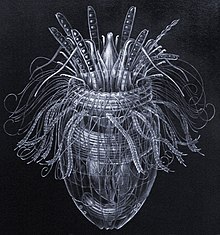Pliciloricus enigmaticus
| Pliciloricus enigmaticus | |
|---|---|

| |
| Pliciloricus enigmaticus (Higgins & Kristensen, 1986)[1] | |
| Scientific classification | |
| Domain: | Eukaryota |
| Kingdom: | Animalia |
| Phylum: | Loricifera |
| Order: | Nanaloricida |
| Family: | Pliciloricidae |
| Genus: | Pliciloricus |
| Species: | P. enigmaticus
|
| Binomial name | |
| Pliciloricus enigmaticus | |

| |
| Distribution of Pliciloricus enigmaticus | |
Pliciloricus enigmaticus is a marine Loriciferan species of genus Pliciloricus first described by Higgins & Kristensen 1986.[1]
Description[edit]
This section may be too technical for most readers to understand. (December 2021) |
Pliciloricus enigmaticus is a marine species in which adults measure between 160–268 µm of length (excluding any cone mouth).[1]
The body is dual compound, located in the second row spinoscalids in position medioventral and lies fused in the middle of its length basal. It usually is very modified, strongly sclerotised, and rigid. The 15 spinoscalids have claws in the third row. Spinoscalids with 4–7 teeth that alternate with spinoscalids that are not modified.
The Lorica features 7 ridges cuticular transverse and longitudinal ridges doubles, 2 plates lateroventral of the caudal region. The anus is terminal.[1]
Distribution[edit]
The species name Pliciloricus enigmaticus has so far only been used for animals found in the northwestern Atlantic Ocean: Two finds off the eastern shore of North America (see map, right).[2]
See also[edit]
References[edit]
- ^ a b c d e Higgins, Robert P.; Kristensen, Reinhardt M. (1986). New Loricifera from southeastern United States coastal waters. Smithsonian Contributions to Zoology. Vol. 438. Washington, DC: Smithsonian Institution Press. pp. 1–70. doi:10.5479/si.00810282.438. ISSN 0081-0282.
- ^ "Pliciloricus enigmaticus (Higgins & Kristensen, 1986)". World Register of Marine Species. Worms. AphiaID 154513.
External links[edit]
 Media related to Pliciloricus enigmaticus at Wikimedia Commons
Media related to Pliciloricus enigmaticus at Wikimedia Commons Data related to Pliciloricus enigmaticus at Wikispecies
Data related to Pliciloricus enigmaticus at Wikispecies- "Pliciloricus enigmaticus (Higgins and Kristensen, 1986)". Integrated Taxonomic Information System (ITIS). Taxonomic Serial No. 722188.
- "Pliciloricus enigmaticus". Smithsonian National Museum of Natural History.
- "Pliciloricus enigmaticus". Encyclopedia of Life (EOL).
- "Pliciloricus enigmaticus (Higgins and Kristensen, 1986)". Index of Organisms Name (ION). LSID 555992.
